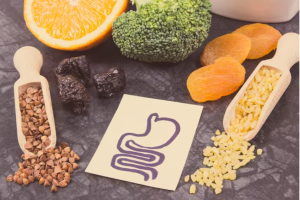Gut-friendly diet tips The foundation of general health is a strong immune system, and the food you eat is one of the most important factors in promoting this system. This is a complete resource for a diet that is kind to the digestive system. Discover the key elements that might support your digestive health, from the meals you enjoy to the practices that promote it.

The Value of a Gut-Friendly Eating Plan
Gut-friendly diet tips Bills of microbes are in your gut, making it a dynamic ecosystem that affects your health. A gut-friendly diet aims to enhance digestive health by increasing the population of good bacteria in the gut. Here are some pointers that should help get you there.
Consume Foods High in Fiber for Optimal Digestive Health
Gut-friendly diet tips: Your gut microorganisms rely on fiber for sustenance. Fruits, vegetables, whole grains, legumes, and other fiber-rich meals feed the good bacteria in your digestive tract. You can keep your gut healthy and happy by eating these foods, which help with digestion and encourage regular bowel movements.
Incorporate Fermented and Probiotic Foods
Gut-friendly diet tips Live bacteria and yeasts, or probiotics, have many positive effects on health, but they are particularly helpful for the digestive tract. Yogurt, kefir, kimchi, sauerkraut, and miso are packed with probiotics, which help maintain a balanced microbiome and improve digestion.
Choose Foods Rich in Prebiotics
Gut-friendly diet tips: Indigestible fibers, known as prebiotics, feed the good bacteria that are already present in your digestive tract. Prebiotics may be abundant in garlic, onions, bananas, and asparagus. When you eat them, you encourage the healthy bacteria in your gut to multiply and do their job better.
Cut Back on Processed Foods
Gut-friendly diet tips Highly processed diets are missing many elements essential to a healthy digestive system. On top of that, they often have artificial substances and additives that mess with your gut flora. Improve your digestion and intestinal health by eating less processed food and more whole, natural foods.
Drink plenty of water.
Gut-friendly diet tips: The digestive tract can only work properly when the body is adequately hydrated. Digestive processes, nutrition absorption, and waste removal are all aided by water in the digestive tract. Drink lots of water throughout the day to help your digestive system work as it should.

Activities for Mindful Eating
Gut-friendly diet tips: Proper digestion of food is possible when you eat slowly and with awareness. Give your body plenty of time to tell when it’s full by chewing your meal carefully and enjoying every bite. Eating less and digesting food better are two benefits of this approach.
Stress Management
Gut-friendly diet tips: Your digestive system can be severely affected by stress. Discover methods that help you relax, including yoga, deep breathing, or meditation. Reducing the likelihood of gastrointestinal problems like bloating and indigestion is one-way stress management promotes a healthy gut.
Incorporate Healthful Fats
Gut health can be helped by eating foods rich in healthy fats, such as avocados, nuts, seeds, and olive oil. In addition to improving digestion generally, they aid in mineral and vitamin absorption and decrease gastrointestinal irritation.
Think About Those Who Are Sensitized to Dairy and Gluten
Gluten and dairy allergies can cause gastrointestinal issues for some people. If you find that certain foods are triggering negative reactions in your body, you may want to cut back or eliminate them.
Physical Exercise consistently
Regular physical activity positively affects health, including the digestive system. Regular bowel movements and the absence of constipation are aided by physical Exercise, which engages the muscles in the digestive system.
In sum,
Eating foods that are good for your digestive system is the goal of a “gut-friendly” diet. Improving digestion and general health may be yours with just a little bit of regular practice of these suggestions for a healthier gut. If you want to boost your digestive health and vigor, remember that even little dietary modifications may have a big effect.
FAQ
Painful, bloated, and gassy? Your intuition may warn you of danger! A gut-friendly diet may restore intestinal balance and internal wellness.
This FAQ guide explains how to nourish your stomach and balance your flora. Get ready to explore some delightful ways to make your meal a gut-friendly paradise:
What is a gut-friendly diet, and why is it important?
Digestive health and a balanced microbiome are two goals of a “gut-friendly” diet. It’s crucial because it supports a healthy gut flora, which helps with digestion, vitamin absorption, and general wellness.
How do gut-friendly diet tips contribute to overall health?
By supporting a healthy gut flora, gut-friendly dietary recommendations are essential for general well-being. A state of homeostasis affects many aspects of health, from digestion and the immune system to psychological well-being.
What are the top gut-friendly foods to include in a diet?
- Vegetables, fruits, whole grains, and legumes are foods that are rich in fiber.
- Fermented foods include probiotics: yogurt, kefir, kimchi, and saucekraut.
- Asparagus, bananas, garlic, and onions are prebiotic foods.
- Fats that are good for you include avocados, almonds, seeds, and olive oil.
How does fiber contribute to a gut-friendly diet?
In addition to helping with digestion and encouraging regular bowel movements, fiber also serves as fuel for good bacteria in the stomach. Preventing digestive problems and improving gut health generally helps maintain a healthy gut environment.
Why are probiotics important for gut health, and what foods contain them?
A healthy gut microbiome, which is good bacteria, is maintained with the help of probiotics. Yogurt, kefir, and other fermented veggie foods are excellent places to find probiotics. These microbes provide a balanced microbiome and help with digestion.

